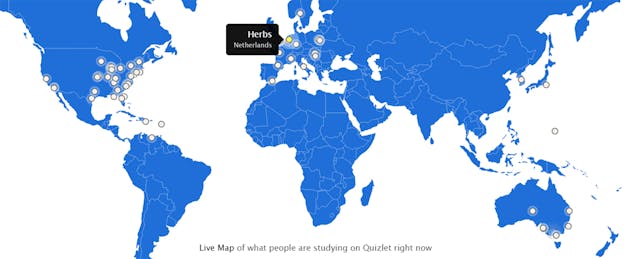Who’s the real “khan” when it comes to the top education website in the United States?
The question is intentionally misleading; the name probably has you thinking about Khan Academy, whose videos reach over 10 million unique users per month.
But since 2005, one company has been soaring high for students and teachers--all while staying under investors’ radar. According to Quantcast’s count, the crown belongs to Quizlet, which has been flirting with cracking Quantcast’s Top 50. (Khan doesn’t even appear on the list.) Not counting YouTube, Wikipedia and Google—which many teachers and students use on a daily basis—that would make Quizlet the top education company on the list.
For a company that eschews the heavy-handed marketing, venture capital and celebrity status prevalent in today’s edtech industry, the numbers are impressive: Quizlet today claims close to 15 million monthly active users, who on average spend close to 20 minutes per session. There are now over 70 million sets of study questions, with close to 1 million sets added each week. The company consistently ranks in the top 10 free education apps in the iTunes and Google Play stores.
These stats, shared by CEO Dave Margulius, are just the latest milestone in Quizlet’s quest to establish, in his words, “a global consumer brand with a simple and effective suite of tools and games that people will use to learn.”
The San Francisco-based company, which has been entirely self-funded, was started by a student, for students. And while the tool has become synonymous with flashcards, students also use it to quiz themselves with multiple-choice tests, practice spelling foreign words via audio exercises, and challenge one another with multi-player games that focus on speed and accuracy.
You currently won’t find anyone with the title of “Sales” or “Marketing” on the team page. That’s something Margulius is proud of—a testament to how the product has successfully spread by word of mouth. He’s shouldered whatever sales and marketing responsibilities have been needed.
But that may soon change, given Quizlet’s ambition to build a global brand. By this time next year, Margulius says the company headcount could spike from 21 to 50 employees as it beefs up product offerings and grows its presence overseas. Quizlet is used in “every country, every day with the exception of North Korea and some countries in West Africa,” Margulius says. To accelerate adoption, the company will begin to provide support for Spanish, French and other languages, and consider putting more resources behind publicity efforts.
The company will also be rolling out new activities designed specifically for the classroom. “Quizlet is developing a set of building blocks and activities that teachers can mix and match to support their instruction,” explains Margulius. For example, there’ll be exercises and games for students to play together as a group, such as a multi-player sentence writing game, that the teacher can moderate.
Margulius estimates that 1 percent of its users are subscribers who pay $15 or $25 per year; napkin math suggests that the company is pulling in at least $3 million in annual user fees. Include revenue from ads, and the Quizlet’s revenue run rate is even higher. The company also had an early helping hand: Margulius used revenue generated by a separate venture, CollectorsWeekly.com, to subsidize Quizlet for its first few years.
“We’ve invested well north of $10 million in capital into Quizlet to date (from revenue), despite not having taken outside investment,” Margulius says.
Dollars are surely important—but only part of the metric that Margulius defines as success. He’s more focused on growing customer loyalty “from grade school to grad school to vocational and lifelong learning.” High school students who first used Quizlet in 2006 as study aids continue to use the tool. Now, even police officers are telling him how Quizlet has helped them make it through the academy.
“People often focus on how dollars are shifting from traditional to online tools,” explains Margulius. “I prefer to look at time—how much time are kids and teachers spending on software? We’ve been the beneficiary of that shift,” he says.


